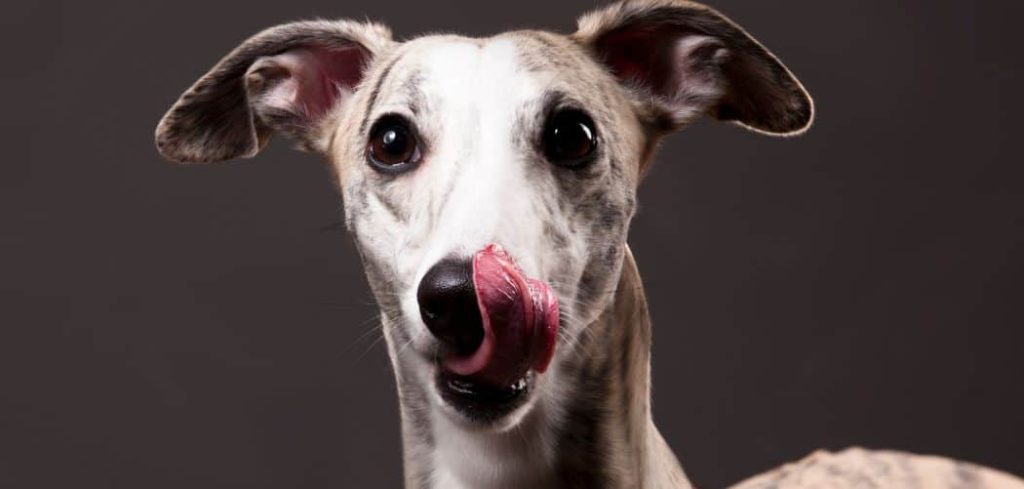Panting and licking the floor can be concerning behaviors in dogs, often signaling discomfort or an underlying medical issue.
While some dogs lick surfaces occasionally, persistent panting and floor-licking may indicate a health problem that needs attention.
We outline the common reasons why dogs may pant and lick the floor, what you can do, and when to seek veterinary help.
Dog Panting and Licking Floor — Why It Happens
When a dog pants and repeatedly licks the floor, it can be a sign of nausea, stress, or even neurological changes in older dogs. Some dogs also lick surfaces when they’ve ingested something irritating or toxic, or if they’re experiencing digestive discomfort.
Occasional floor licking might be harmless curiosity, but if it’s paired with heavy panting or other symptoms, it warrants attention.

Dog Panting and Licking Floor: Common Causes
Anxiety and Stress
Panting and licking the floor can be a response to anxiety or stress. Dogs often use licking as a self-soothing mechanism when they feel overwhelmed or nervous.
Triggers may include loud noises, changes in routine, separation from their owner, or new environments.
Alongside floor-licking and panting, dogs may show pacing, whining, or attempts to hide. Persistent stress can affect appetite, behavior, and overall health.
Nausea or Gastrointestinal Upset
Licking the floor can be a sign of nausea or digestive discomfort. Dogs sometimes lick surfaces in an attempt to relieve queasy feelings, and panting may accompany this due to discomfort or anxiety.
Causes can include gastrointestinal infections, ingestion of toxic substances, or digestive disorders. Owners may notice drooling, vomiting, diarrhea, or reluctance to eat.
Oral or Dental Pain
Dental issues can also prompt dogs to lick the floor. Discomfort in the mouth from gum disease, loose teeth, or oral injuries may cause dogs to lick surfaces to relieve irritation.
Panting may accompany oral pain due to stress or difficulty eating. Additional signs include bad breath, reluctance to chew, pawing at the mouth, or visible swelling in the gums.
Boredom or Attention-Seeking Behavior
Dogs may lick floors out of boredom or for attention. This is often seen in dogs that lack sufficient mental or physical stimulation. Panting may occur if the dog is excited or overstimulated.
Owners may notice repetitive floor-licking during periods of inactivity or when ignored. Providing toys, interactive play, and structured routines can help reduce these behaviors.
Poisoning or Toxic Ingestion
Panting and floor-licking can indicate exposure to harmful substances. Dogs may lick surfaces contaminated with chemicals, cleaning products, or plants that are toxic.
Symptoms may include vomiting, diarrhea, drooling, tremors, or lethargy alongside panting. Immediate veterinary intervention is essential to prevent severe complications or poisoning.
Compulsive or Neurological Disorders
Some dogs develop compulsive licking behaviors due to neurological or behavioral disorders. Panting may accompany these behaviors if the dog is anxious or stressed.
Compulsive floor-licking is often repetitive, excessive, and seems purposeless. Veterinary evaluation can help identify underlying neurological conditions or behavioral issues and guide treatment options.
What to Do If Your Dog Is Panting and Licking Floor
Observe your dog closely to identify triggers such as stress, boredom, or potential toxins. Remove access to harmful substances or unsafe surfaces.
Ensure your dog stays hydrated, particularly if panting is frequent or intense. Fresh water supports comfort and overall health.
Provide mental and physical stimulation through toys, walks, and interactive activities. Reducing boredom can decrease attention-seeking licking behaviors.
Check your dog for oral pain or digestive upset. Inspect the mouth for swollen gums, bad breath, or loose teeth and monitor for signs of nausea or vomiting.
Consult your veterinarian if panting and floor-licking persist. They can rule out medical causes, evaluate for toxins, and provide guidance on behavioral interventions if necessary.
When to Call or Visit Your Vet
Immediate veterinary attention is needed if you notice:
Persistent, excessive panting and licking
Vomiting, diarrhea, or refusal to eat or drink
Signs of poisoning or ingestion of toxic substances
Swelling, bleeding, or oral pain
Lethargy, disorientation, or collapse
Prompt intervention ensures your dog’s health and comfort, preventing serious complications.
Read more: Dog Panting and Licking a Lot (Why it happens and what to do)
Read more: Old Dog Panting and Restless (Causes and care tips)
Read more: Dog panting excessively (Here’s Why)
Key Takeaway
Panting and floor-licking in dogs can signal stress, boredom, nausea, oral pain, or exposure to toxins.
Observing your dog closely, providing a safe and stimulating environment, and seeking veterinary care when necessary are essential steps.
Early recognition and intervention can improve your dog’s comfort and prevent serious health issues.
